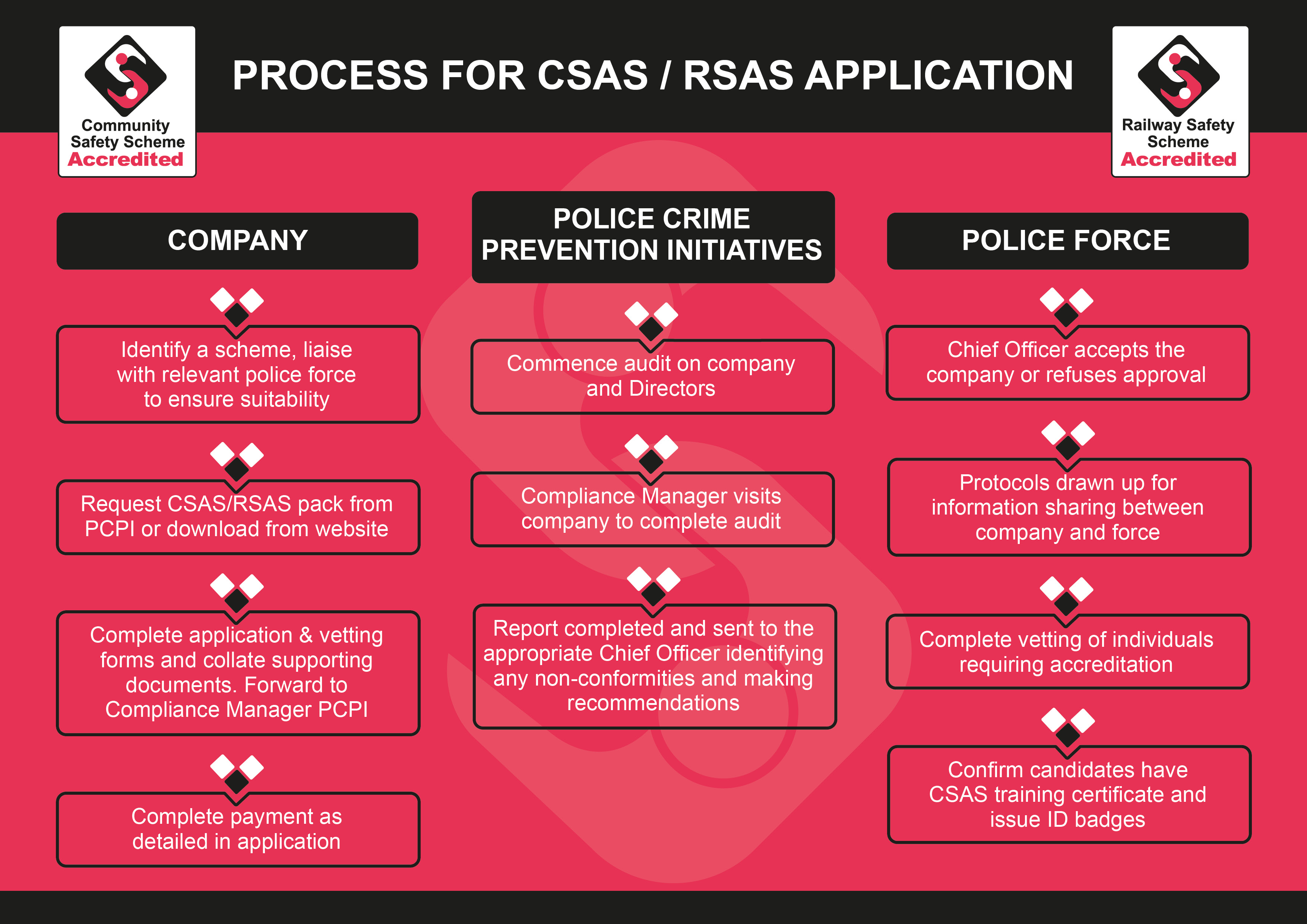Apply for Approval
What are the Community and Railway Safety Accreditation Schemes?
Community Safety Accreditation Scheme
The Community Safety Accreditation Scheme (CSAS) allows a Chief Constable to accredit non police staff of organisations, such as security guards, wardens and traffic management officers with powers to tackle graffiti, litter and anti-social behaviour.
Railway Safety Accreditation Scheme
The Railway Safety Accreditation Scheme (RSAS) allows the Chief Constable of British Transport Police (BTP) to delegate policing powers to properly trained, vetted and accredited staff who can make a significant contribution to safety on the railways.
The schemes have been established for the purposes of contributing to community safety and in co-operation with the police, combating crime and disorder, public nuisance, and other forms of antisocial behaviour.
Private sector companies, Trusts and Charities may apply to become approved if they satisfy a range of policy requirements. The public sector must apply directly with their local police force.
After successful approval, employees of the company must apply for accreditation with their local police force. If successful, they will become an ‘accredited person’ (AP). Accredited staff have to display a nationally approved badge when on duty under the scheme and complete the approved training which demonstrates high personnel standards.
What powers can my employees gain?
There are over 20 powers available to your employees if they become an accredited person. The Chief Officers may choose to give them all, some or none of the powers available depending on the scheme being applied to.
Accredited persons will only be awarded powers that are appropriate to the roles they carry out. While on duty they must be in company uniform, wear the CSAS or RSAS approved badge and carry police issued ID cards that identify them, their role and the powers they have.
- Take the name and address of a person when committing an offence
- Confiscate tobacco products from young persons
- Deal with begging
- Stop cyclists riding in prohibited areas
- Issue Fixed Penalty Notices (FPN) or occasionally, Penalty Notices Disorder (PND)
Reasons to join:
Aside from empowering your employees whilst reducing police time and resources for low level crime, there are numerous benefits for a company to apply for approval:

Improved Intelligence
As officers will be providing a true team response, sharing information and intelligence with the police and agencies.

Legal Protection
Your employees will be trained to deal with the situations they encounter and be protected by legislation.

Raise Your Profile
By working towards social cohesion, building safer communities, and improving the appearance and management of local areas.

Career Development
Improved career development opportunities for employees to enrich their current role and develop new skills.

National Recognition
By working to national standards and wearing official badges you will have a recognised role and the power and ability to deal with nuisances.
Company Requirements
The company/employer is required to:
- be a fit and proper person to supervise the carrying out of the functions for the purpose of which accreditation is to be granted (PRA 2002: sec 41(4)(a))
- have established and maintain satisfactory arrangements for the handling of complaints PRA 2002: sec 40(8))
- have a recruitment policy
- have a code of conduct policy
- have sufficient public liability insurance
It is important to note, vetting is currently carried out in the force area of the first scheme applied to and the level of vetting will depend on the role they will be carrying out.
Employee Requirements
Employee/accredited persons criteria:
- Must be 18 years of age or over
- Must be fit for the role
- Must be successfully vetted
- Must be employed in a Community Safety role
- Must have appropriate training
- Must be wearing a company uniform displaying the CSAS or RSAS logo
- Must carry ID badges
It is important to note, vetting is currently carried out in the force area of the first scheme applied to and the level of vetting will depend on the role they will be carrying out.
What is the Application Process?
The application process for CSAS and RSAS are the same, though the wording of the declarations are slightly different. If a company or organisation wishes to work with schemes in both areas, separate forms need to be completed.
If no material changes have occurred within the company and the applications were made within a relatively short period of time, then the production of supporting documents may not be needed for the second application.
Applications will have to be renewed every 3 years to ensure that the company or organisation keeps working to the required standard and to fulfil obligations under the Data Protection Act 2018.

How much does an application cost?
New CSAS & RSAS Applications
Renewal CSAS & RSAS Applications
£2060 plus VAT
£1450 plus VAT
Renewals for CSAS and RSAS are required three years after the first audit date and every 3 years thereafter.
How do I apply?
The application and renewal forms for private companies, organisations, trusts and charities are available below. Once completed the form needs to be submitted with full supporting documents and ID as outlined on the form.
Details of the scheme being applied for, background information about the company and the supporting documents are used to begin a report which is finalised after a visit is made by the Compliance Manager of Police Crime Prevention Initiatives.